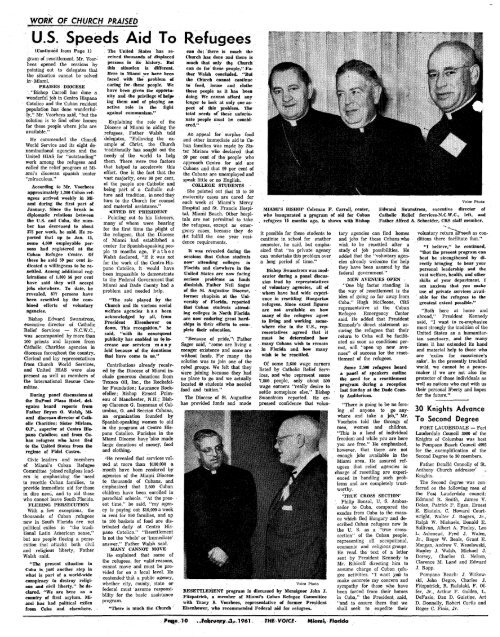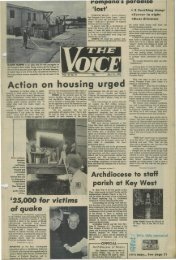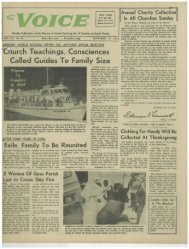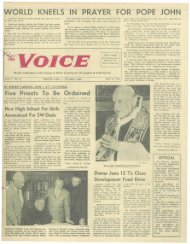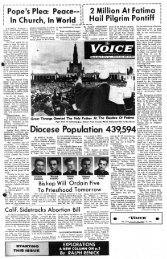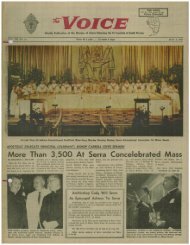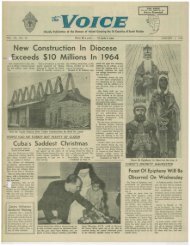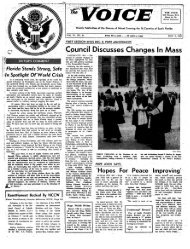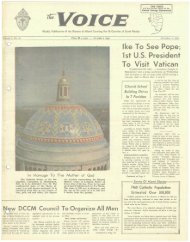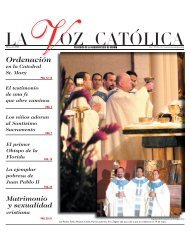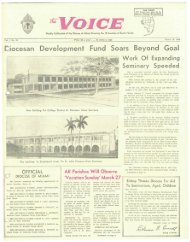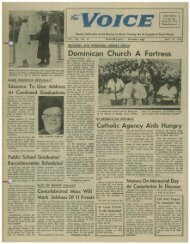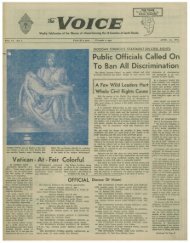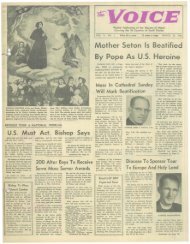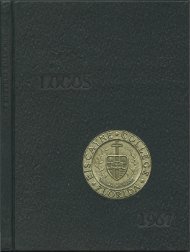02-03-1961 - E-Research
02-03-1961 - E-Research
02-03-1961 - E-Research
Create successful ePaper yourself
Turn your PDF publications into a flip-book with our unique Google optimized e-Paper software.
WORK OF CHURCH PRAISED<br />
U.S.. Speeds Aid To Refugees<br />
(Continued from Page 1)<br />
gram of resettlement, Mr. Voornees<br />
opened the sessions by<br />
pointing out to delegates that<br />
the situation cannot be solved<br />
in^Miami.<br />
PRAISES DIOCESE<br />
"Bishop Carroll has done a<br />
•wonderful job in Centro Hispano<br />
Catolico and the Cuban resident<br />
population has done wonderfully,"<br />
Mr. Voorhees said, "but the<br />
solution is to find other homes<br />
for these people where jobs are<br />
available."<br />
He commended the ChurcH<br />
World Service and its eight denominational<br />
agencies and the<br />
United HiAS for "outstanding"<br />
work among the refugees and<br />
called the relief program at Miami's<br />
diocesan Spanish center<br />
"miraculous."<br />
According to Mr. Voorhees<br />
approximately 1,300 Cuban refugees<br />
arrived weekly in Miami<br />
during the first part of<br />
January. Since the break in<br />
diplomatic relations .between<br />
the U.S. and Cuba, the number<br />
has decreased to about<br />
375 per week, he said. He reported<br />
that up to Jan. 15,<br />
some 4,000 employable persons<br />
had registered at the<br />
Cuban Refugee Center. Of<br />
these he said 59 per cent indicated<br />
a willingness to be resettled.<br />
Among additional registrations<br />
of 1,300 56 per cent<br />
have said they will accept<br />
jobs elsewhere. To date, he<br />
revealed, 877 persons have<br />
been resettled by the combined<br />
efforts of voluntary<br />
agencies.<br />
Bishop Edward Swanstrom,<br />
executive director of Catholic<br />
Belief Services — N.C.W.C,<br />
was accompanied by more than<br />
100 priests and laymen from<br />
Catholic Charities agencies in<br />
dioceses throughout the country.<br />
Clerical and lay representatives<br />
from Church World Services,<br />
and United HIAS were also<br />
present as well as members of<br />
the International Rescue Committee.<br />
During panel discussions at<br />
the DuPont Plaza Hotel, delegates<br />
heard reports from<br />
Father Bryan O. Walsh, Miami<br />
diocesan director of Catholic<br />
Charities; Sister Miriam,<br />
O.P., superior at Centro Hispano<br />
Catolico; and from Cuban<br />
refugees who have fled<br />
to the United States from the<br />
regime of Fidel Castro.<br />
Civic leaders and members<br />
of Miami's Cuban Refugee<br />
Committee joined religious leaders<br />
in emphasizing the need<br />
to resettle Cuban families, to<br />
provide immediate aid for those<br />
in dire neeu, and to aid those<br />
who cannot leave South Florida.<br />
FLEEING PERSECUTION<br />
With a few exceptions, the<br />
thousands of Cuban refugees<br />
now in South Florida are not<br />
political exiles in "the traditional<br />
Latin American sense,"<br />
but are people fleeing a persecution<br />
that attacks both civil<br />
and religious liberty,<br />
Walsh said.<br />
Father<br />
"The present situation in<br />
Cuba is just another step in<br />
what is part of a world-wide<br />
conspiracy to destroy religious<br />
and civil liberty," he declared.<br />
"We are here as a<br />
country of first asylum. Miami<br />
has had political exiles<br />
from Cuba and elsewhere.<br />
The United States has received<br />
thousands- of displaced<br />
persons in it's 1 , history. But<br />
this situation is different.<br />
Here in Miami we have been<br />
faced with the problem of<br />
caring for these people. We<br />
have been given the opportunity<br />
and the privilege of help*<br />
ing them and of playing an<br />
active role in the fight<br />
against communism."<br />
Explaining the role of the<br />
Diocese of Miami in aiding the<br />
refugees, Father Walsh told<br />
delegates, "Following the example<br />
of Christ, the Church<br />
traditionally has sought out the<br />
needy of the world to help<br />
them. There were two factors<br />
that helped to accelerate this<br />
effort. One is the fact that the<br />
vast majority, over 90 per cent,<br />
of the people are Catholic and<br />
being part of a Catholic culture<br />
and tradition, in need they<br />
turn to the Church for counsel<br />
and material assistance."<br />
"CITED BY PRESIDENT<br />
- Pointing out to his listeners,<br />
many of whom were hearing<br />
for the first time the plight of<br />
the refugees, that the Diocese<br />
of Miami had established a<br />
center for Spanish-speaking people<br />
15 months ago, Father<br />
Walsh declared, "If it was not<br />
for the work of the Centro Hispano<br />
Catolico, it would have<br />
been impossible to demonstrate<br />
to the Federal Government that<br />
Miami and Dade County had a<br />
problem and needed help.<br />
"The role played fyy the<br />
Church and its various social<br />
welfare agencies has been<br />
acknowledged by all, from<br />
President Eisenhower on<br />
down. This recognition," he<br />
said, "with its consequent<br />
publicity has enabled us to increase<br />
our services many<br />
fold because of the donations<br />
that have come to us."<br />
Contributions already received<br />
by the Diocese of Miami include<br />
generous donations from<br />
Texaco Oil, Inc., the Rockefeller<br />
Foundation; Laurance Rockefeller;<br />
Bishop Ernest Primeau<br />
of Manchester, N.H.; Bishop<br />
Clarence G. Issenman of Columbus,<br />
O. and Seccion Cubana,<br />
an organization founded by<br />
Spanish-speaking women to aid<br />
in the program at Centro Hispano<br />
Catolico. Parishes in the<br />
Miami Diocese haye "also made<br />
large donations of money, food<br />
and clothing.<br />
He revealed that services valued<br />
at more than $100,000 a<br />
month have been rendered by<br />
agencies of the Miami Diocese<br />
to thousands of Cubans, and<br />
emphasized that 2,600 Cuban<br />
children have been enrolled in<br />
parochial schools. "At the pres- •<br />
ent time," he said, "my agency<br />
is paying out $10,000 a week<br />
in rent for 950 families, and up<br />
to 100 baskets of food are distributed<br />
daily at Centro Hispano<br />
Catolico." "Resettlement<br />
Is not the 'whole' or 'immediate'<br />
answer," Father Walsh said.<br />
MANY CANNOT MOVE<br />
He explained that some of<br />
the refugees, for valid reasons,<br />
cannot move and must be provided<br />
for on a local level. He<br />
• contended'that a public agency,<br />
whether city, county, state or<br />
federal must assume responsibility<br />
for the basic assistance<br />
program.<br />
"There is much the Church<br />
can do; there is much the<br />
Church has done and there is<br />
much that only the Church<br />
can do for these people/' Father<br />
Walsh concluded. "But<br />
the ChurcH cannot continue<br />
to feed, house and clothe<br />
these people as it has been<br />
doing. We cannot afford any<br />
longer to look at only one aspect<br />
of this problem. The<br />
total needs of these unfortunate<br />
people must be considered."<br />
An appeal for surplus food<br />
and other immediate aid to Cuban<br />
families was made by Sister<br />
Miriam who declared that<br />
9 per cent of the people who<br />
approach Centro for aid are<br />
Cubans and that 99 per cent of<br />
the Cubans are unemployed and<br />
speak little or no English.<br />
COLLEGE STUDENTS<br />
She pointed out that 15 to 20<br />
maternity cases are cared for<br />
each week at Miami's Mercy<br />
Hospital and St. Francis Hospital,<br />
Miami Beach. Other hospitals<br />
are not permitted to take<br />
the refugees, except as emergency<br />
cases, because they do<br />
itot fulfill -the one year residence<br />
requirements.<br />
It was revealed during the<br />
sessions that Cuban students<br />
now attending colleges in<br />
Florida and elsewhere in the<br />
United States are now facing<br />
serious problems as funds<br />
diminish. Father Neil Sager<br />
of the St. Augustine Diocese, -<br />
former chaplain at the University<br />
of Florida, reported<br />
that Cuban students attending<br />
colleges in North Florida<br />
are now enduring great hardships<br />
in their efforts to complete<br />
their education.<br />
"Because of pride,") Father<br />
Sager said, "some are living a<br />
meager existence and some are<br />
without funds. For many the<br />
solution was to join one of the<br />
rebel groups. We felt that they<br />
were joining because they had<br />
no place to go and we actually<br />
located 40 students who needed<br />
, food and tuition."<br />
The Diocese of St. Augustine<br />
has provided funds and made<br />
MIAMI'S BISHOP Coleman F. Carroll, center,<br />
who inaugurated a program of aid for Cuban<br />
refugees 15 months ago, is shown with Bishop<br />
it possible for these students to<br />
continue in school for another<br />
semester, he said, but emphasized<br />
that "no private agency<br />
can undertake this problem over<br />
a long period of time."<br />
Bishop Swanstrom was moderator<br />
during a panel discussion<br />
lead by representatives<br />
of voluntary agencies, all of<br />
whom have had wide experience<br />
in resettling Hungarian<br />
refugees. Since exact figures<br />
are not available on how<br />
many of the refugees agree<br />
to living and working somewhere<br />
else in. the U.S., representatives<br />
agreed that it<br />
must be determined how<br />
..many Cubans wish to remain<br />
in Florida and how many<br />
wish to be resettled.<br />
Of some 2,600 wage earners<br />
listed by Catholic Relief Services,<br />
and who represent some<br />
7,500. people, only about 500<br />
wage earners "really desire to<br />
settle someplace else," Bishop<br />
Swanstrom reported. He expressed<br />
confidence that volun-<br />
Volce Photo<br />
RESETTLEMENT program is discussed by Monsignor John J.<br />
Fitzpatrick, a member of Miami's Cuban Refugee Committee<br />
with Tracy S. Voorhees, representative of former President<br />
Eisenhower, who recommended Federal aid for refugees.<br />
Page 10 (,February,^,<strong>1961</strong> THE VOICE• Miami, Florida<br />
tary agencies can find homes<br />
and jobs for those Cubans who<br />
wish to be resettled after a<br />
study of job possibilities. He<br />
added that the "voluntary agencies<br />
already welcome the help<br />
they have been assured by the<br />
federal government."<br />
NEW AVENUES OPEN<br />
"One big factor standing in<br />
the way of resettlement is the<br />
idea of going so far away from<br />
Cuba." Hugh McCloone, CRS<br />
representative at the Cuban<br />
Refugee Emergency Center<br />
said. He added that President<br />
Kennedy's direct statement assuring<br />
the refugees that their<br />
return to Cuba will be facilitated<br />
as soon as conditions permit,<br />
will "open up new avenues"<br />
of success for the resettlement<br />
of the refugees.<br />
Some 2,500 refugees heard<br />
a panel of speakers outline<br />
the need for a resettlement<br />
program during a reception<br />
, last Sunday at the Dade County<br />
Auditorium.<br />
"There is going to be no forcing<br />
, of anyone to go anywhere<br />
and take a job," Mr.<br />
Voorhees told the throngs of<br />
men, women and children.<br />
"This is a land of individual<br />
freedom and while you are here<br />
you are free." He emphasized,<br />
however, that there are not<br />
enough jobs available in the<br />
Miami area. He assured refugees<br />
that relief agencies in<br />
charge of resettling are experienced<br />
in handling such problems<br />
and are completely trustworthy.<br />
'TRUE CROSS SECTION'<br />
Philip Bonsai, U. S. Ambassador<br />
to Cuba, compared the<br />
exodus from Cuba to the masses<br />
which fled Hungary and described<br />
Cuban refugees now in<br />
the U. S. as a "true crosssection"<br />
of the Cuban people,<br />
representing all occupational,<br />
economic and religious groups.<br />
He read the text of a letter<br />
sent by President Kennedy to<br />
Mr. Ribicoff directing him to<br />
assume charge of Cuban refugee<br />
activities. "I want yoU to<br />
make concrete my concern and<br />
sympathy for those who have<br />
been forced from . their homes<br />
in Cuba," the President, said,<br />
"and to assure them that we<br />
shall seek to expedite their<br />
Voice Photo<br />
Edward Swanstrom, executive director of<br />
Catholic Relief Services-N.C.W.C, left, and<br />
Father Alfred A. Schneider, CRS staff member.<br />
voluntary return aSfisoon as conditions<br />
there facilitate that."<br />
"I believe," he continued,<br />
"that the present program can<br />
best be strengthened by directly<br />
bringing to bear your<br />
personal leadership and the<br />
vast welfare, health, and other<br />
skills of your department. I<br />
am anxious that you make<br />
use of private services available<br />
for the refugees to the<br />
greatest extent possible."<br />
"Both here at home and<br />
abroad," President Kennedy<br />
said, "I want to re-emphasize<br />
most strongly the tradition of the<br />
United States as a humanitarian<br />
sanctuary, and the many<br />
times it has extended its hand<br />
and material help to those who<br />
are 'exiles for conscience's<br />
sake'. In the presently troubled<br />
world, we cannot be a peacemaker<br />
if we are not also the<br />
protector of those individuals as<br />
well as nations who cast with us<br />
their personal liberty and hopes<br />
for the future."<br />
30 Knights Advance<br />
To Second Degree<br />
FORT LAUDERDALE — Fort<br />
Lauderdale Council 3080 of the<br />
Knights of Columbus was host<br />
to Pompano Beach Council 4995<br />
for the, exemplification of the<br />
Second Degree to 30 members.<br />
Father Donaid Connolly of St.<br />
Anthony Church addresser ^<br />
Knights.<br />
The Second degree was conferred<br />
on the following men of<br />
the Font Lauderdale council:<br />
Edmund R. Smith, James V.<br />
Dolan, Patrick F. Egan, Ernest<br />
E. Ekstein, C. Howard Courtwright,<br />
Walter J. Rogers, Jr.,<br />
Ralph W. Michaels/Donald E.<br />
Sullivan, Albert A. Feeley, Leo<br />
L. Ashmead, Fred J. Walen,<br />
Jr., Roger W. Beals, Grant E.<br />
Morgan, Andrew V. Wesolowski,<br />
Stanley J. Walsh, Michael J.<br />
Dorsey, Charles G. Nelson,<br />
Clarence M. Land and Edward<br />
J. Rapp.<br />
Pompano Beach: J. Witkowski,<br />
John Degro, Charles J.<br />
Fitzpatrick, R. Rafalaki, F. Offer,<br />
Jr., Arthur F. Golden, L.<br />
DeFasio, Dan D. Guistine, Art<br />
D. Donnelly, Robert Curtis and<br />
Roger C. Finis, Jr.


